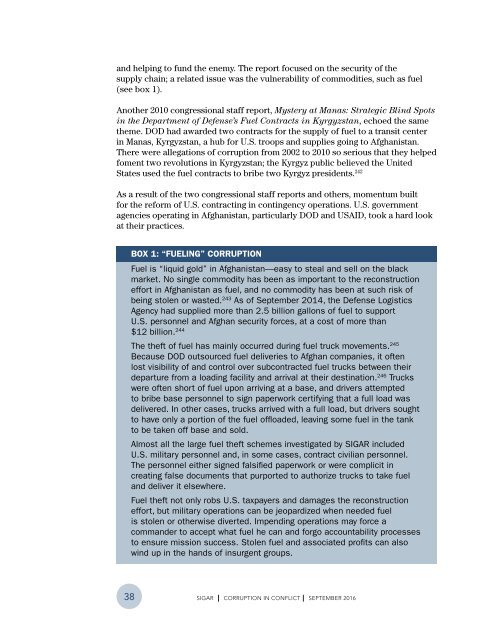CORRUPTION IN CONFLICT
5IlaWjQej
5IlaWjQej
Create successful ePaper yourself
Turn your PDF publications into a flip-book with our unique Google optimized e-Paper software.
and helping to fund the enemy. The report focused on the security of the<br />
supply chain; a related issue was the vulnerability of commodities, such as fuel<br />
(see box 1).<br />
Another 2010 congressional staff report, Mystery at Manas: Strategic Blind Spots<br />
in the Department of Defense’s Fuel Contracts in Kyrgyzstan, echoed the same<br />
theme. DOD had awarded two contracts for the supply of fuel to a transit center<br />
in Manas, Kyrgyzstan, a hub for U.S. troops and supplies going to Afghanistan.<br />
There were allegations of corruption from 2002 to 2010 so serious that they helped<br />
foment two revolutions in Kyrgyzstan; the Kyrgyz public believed the United<br />
States used the fuel contracts to bribe two Kyrgyz presidents. 242<br />
As a result of the two congressional staff reports and others, momentum built<br />
for the reform of U.S. contracting in contingency operations. U.S. government<br />
agencies operating in Afghanistan, particularly DOD and USAID, took a hard look<br />
at their practices.<br />
BOX 1: “FUEL<strong>IN</strong>G” <strong>CORRUPTION</strong><br />
Fuel is “liquid gold” in Afghanistan—easy to steal and sell on the black<br />
market. No single commodity has been as important to the reconstruction<br />
effort in Afghanistan as fuel, and no commodity has been at such risk of<br />
being stolen or wasted. 243 As of September 2014, the Defense Logistics<br />
Agency had supplied more than 2.5 billion gallons of fuel to support<br />
U.S. personnel and Afghan security forces, at a cost of more than<br />
$12 billion. 244<br />
The theft of fuel has mainly occurred during fuel truck movements. 245<br />
Because DOD outsourced fuel deliveries to Afghan companies, it often<br />
lost visibility of and control over subcontracted fuel trucks between their<br />
departure from a loading facility and arrival at their destination. 246 Trucks<br />
were often short of fuel upon arriving at a base, and drivers attempted<br />
to bribe base personnel to sign paperwork certifying that a full load was<br />
delivered. In other cases, trucks arrived with a full load, but drivers sought<br />
to have only a portion of the fuel offloaded, leaving some fuel in the tank<br />
to be taken off base and sold.<br />
Almost all the large fuel theft schemes investigated by SIGAR included<br />
U.S. military personnel and, in some cases, contract civilian personnel.<br />
The personnel either signed falsified paperwork or were complicit in<br />
creating false documents that purported to authorize trucks to take fuel<br />
and deliver it elsewhere.<br />
Fuel theft not only robs U.S. taxpayers and damages the reconstruction<br />
effort, but military operations can be jeopardized when needed fuel<br />
is stolen or otherwise diverted. Impending operations may force a<br />
commander to accept what fuel he can and forgo accountability processes<br />
to ensure mission success. Stolen fuel and associated profits can also<br />
wind up in the hands of insurgent groups.<br />
38<br />
SIGAR I <strong>CORRUPTION</strong> <strong>IN</strong> <strong>CONFLICT</strong> I SEPTEMBER 2016


